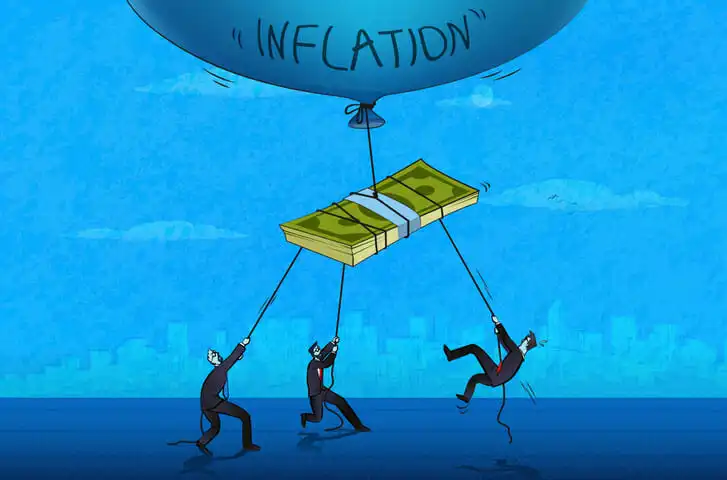A contracting economy can impact your finances in several ways. A common question during such times is: What happens to interest rates in a recession? Typically, interest rates decline in the early stages of a recession to encourage spending and borrowing. While lower rates can be advantageous if you’re considering loans, they may also slow the growth of funds in savings or CD accounts, affecting the interest earned on your savings.
A financial advisor can help you analyze investments and manage risk during a recession.
What Is a Recession?
A recession is marked by a period of economic decline. The technical definition is at least two consecutive quarters of negative economic growth as measured by gross domestic product (GDP). Often, though, the term “recession” is used more broadly. For example, the National Bureau of Economic Research (NBER) characterizes recessions as a significant economic decline that lasts for more than a few months.
When recessions happen, unemployment tends to increase as economic production and output slows. Companies lay off employees in order to preserve profit margins. Meanwhile, those who have been laid off tend to conserve funds and spend less on discretionary purchases, like travel or new cars.
Recessions are part of the economic cycle. In this cycle, you have periods of expansion when the economy is booming. Eventually, the expansion period peaks and a period of contraction begins. This is when you get a recession. There’s a trough where the economy hits its lowest point before the cycle begins again with another period of expansion.
What Causes Recessions?
There’s no single cause that drives recessions. They can be triggered by a number of circumstances, and there’s no way to accurately predict exactly when a recession will begin. Seven common causes of recessions include:
- Geopolitical events that increase stock market volatility
- Global pandemics
- Natural disasters that deliver a large-scale economic shock
- Sharp drops in consumption and demand
- Faltering confidence in the markets and economy
- Market bubbles
- High interest rates
Whether a recession is short-lived or not typically depends on the factors that lead up to it. The Great Recession, for example, lasted for approximately 18 months. That recession was largely triggered by the subprime mortgage market crisis, which lead to a housing market crash. How long a recession lasts is different for each one.
What Happens to Interest Rates During a Recession?

The Federal Reserve uses monetary policy to steer interest rates during recessionary periods. When a recession sets in, the Fed may reduce the federal funds rate in order to spur economic growth. The federal funds rate is the rate at which banks lend money to one another overnight.
When the federal funds rate drops, banks and lenders typically adjust interest rates for loans accordingly. That means loans and lines of credit become less expensive to borrowers. The idea behind this strategy is that if credit is more accessible, more people will borrow. As they spend what they borrow, they funnel money back into the economy to help pull it out of a recession.
While lower rates on loans are a boon for consumers, there is a downside. As rates drop, banks can also cut back on the interest they pay to savers. So you’ll typically see lower rates for deposit accounts, including savings accounts, CD accounts and money market accounts, during a recession. That’s a disadvantage if you’re hoping to grow your money at a great rate.
Rate drops are more common in the early stages of a recession. As the economy begins to pick up, the Federal Reserve may adjust its interest rate policy. Once the economy begins to approach the peak of an expansion period, the Fed may raise rates in order to curb borrowing and spending. This is usually done to prevent the economy from overheating.
How to Navigate Interest Rates During a Recession
The most important thing to remember about what happens to interest rates during a recession is that they’re fluid. Where rates are at the beginning of a recession are not an exact indicator of where they’ll be once a recession ends.
With that in mind, here are four strategies for managing a changing rate environment during a recession:
- Consider changing banks. If you have money in savings accounts, CDs or money market accounts, switching banks could be a good move if a recession is looming. Moving to an online bank, for example, could allow you to get a higher interest rate and APY on savings balances. Online banks have lower overhead costs than traditional banks and can pass that savings on to their customers.
- Weigh the benefits of refinancing. Mortgage rate movements are not directly affected by changes to the federal funds rate. Instead, they’re tied to the Treasury yield curve. If mortgage rates go down during a recession, that could be a good time to score a better deal on your mortgage. Just consider what you might pay in closing costs and how long it’ll take you to break even to recoup any savings with a lower rate before refinancing.
- Consolidate other debts. If you have high-interest debt, a recession could be a good time to consider consolidating them with a low-interest personal loan. You could also try a 0% balance transfer credit card offer if you qualify for one. If you have student loans, refinancing them to a new loan with a lower rate is another possibility for saving money.
- Lock in fixed-rate loans. If you need to borrow money, consider getting a fixed-rate loan before rates go up. During a recession, interest rates can change and variable-rate loans may become more expensive. If you have an adjustable-rate mortgage, private student loans, or a home equity line of credit (HELOC), switching to a fixed-rate loan can give you stable payments. Even if rates drop later, having a fixed rate can protect you from unexpected increases.
Other Considerations
Also, consider how a recession might impact your portfolio. If the market is experiencing increased volatility, for example, that could cause the value of your stock allocation to drop. Bonds are generally a safe haven, though changing interest rates can affect which maturities are the best investments during a recession.
You might add some recession-proof investments for diversification to offset any negative impacts of a downturn. Real estate, for example, has a low correlation to the stock market and is considered to be a good hedge against recessions and inflation as people still need housing. You don’t necessarily need to buy rental property to invest in real estate in a recession either. Other investment options include real estate mutual funds and exchange-traded funds, real estate investment trusts (REITs) and real estate crowdfunding.
Finally, you may want to think about having extra cash available during a recession. If you lose your job or face unexpected expenses, cash reserves can help cover bills without needing to sell investments at a loss. Additionally, keeping money in a high-yield savings account, short-term CDs, or money market funds allows you to earn some interest while keeping your funds accessible.
Bottom Line

Recessions are unpleasant to say the least, but they’re a natural part of the economic cycle. Knowing what happens to interest rates during a recession and how to spot the signs of an impending downturn can help you to fine-tune your financial strategy to minimize potentially negative impacts.
Investing Tips
- Consider talking to your financial advisor about how to manage your investments and overall financial situation when a recession appears to be on the horizon. Finding a financial advisor doesn’t have to be hard. SmartAsset’s free tool matches matches you with vetted financial advisors who serve your area, and you can have a free introductory call with your advisor matches to decide which one you feel is right for you. If you’re ready to find an advisor who can help you achieve your financial goals, get started now.
- When a recession is accompanied by high unemployment and rising consumer prices, the end result is stagflation. While stagflation is relatively rare, it can and has happened in the U.S. economy. Learning some strategies for investing during stagflation, such as adding Treasury Inflation Protected Securities (TIPS) to your portfolio, can make it easier to weather this type of economic event should it occur.
Photo credit:©iStock.com/elenaleonova, ©iStock.com/Pekic, ©iStock.com/Cemile Bingol
